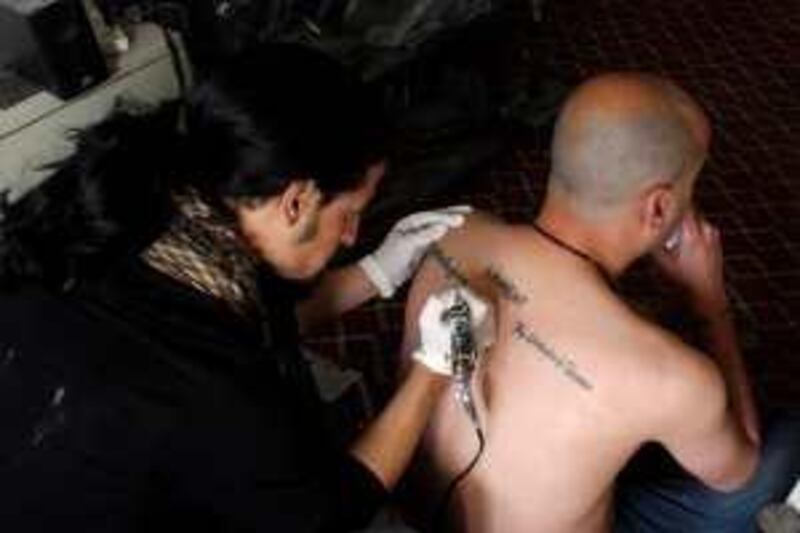BAGHDAD // The first tattoo Mohammed Atshan gave someone was simple: a name, a family phone number and an e-mail address, etched into the top of the man's arm. Nothing elaborate, but the implications profound. "His name was Ali Jaffar and he was a soldier in the Iraq army," said Mr Atshan, a small, wiry 20-year-old with a ponytail and goatee. That was in 2005 and Iraq was spiralling out of control. It was on the brink of an all-out sectarian war, and in a country with few markets left, Mr Atshan had found an opening.
"If he was killed he wanted people to be able to contact his family," he said. As he talked his fingers deftly handled a cigarette. People were being killed in increasing numbers and the morgues were stacked with bodies. With a simple homemade tattoo machine, Mr Atshan began inscribing more names and addresses on people's arms. The hope was that a policeman, a morgue attendant, a doctor or a nurse would see the marking and call the family. There would be no harrowing wait or painful search through the grisly corridors of Iraq's hospitals and morgues. The call would be made and the body collected.
As Iraq has clawed its way back from the savagery that had engulfed it, Mr Atshan has evolved his business. "I borrowed $600 [Dh2,200] to buy a proper machine from Italy," he said. With the electric tattoo machine, complete with proper needles and ink, he could start focusing on more intricate designs. "The price all depends on the size - the cheapest is $20 and the most expensive between $150 to $200," said Mr Atshan, who has recently branded an angel and a devil on one man's back.
There are still dangers, though. Tattooing is haram, or religiously forbidden, and tattooists have been targets in Iraq. Many see it as a sign of western decadence. The man who taught Mr Atshan was shot twice in the arm; he survived but has gone underground. Another artist refused to talk for fear of reprisals. Members of the Mahdi Army, a Shiite paramilitary force, said that if Mr Atshan did not stop inking people, they would cut off his legs. It was a particularly poignant threat given that he has a tattoo of the Statue of Liberty on his right calf.
"Americans gave us freedom ? In spite of what they did I like them," he said. Mr Atshan moved house after he was threatened. Despite improved security, Mr Atshan still takes precautions to protect himself. When he tattoos friends he brings them to his house. With people he does not know he goes to their homes or meets them in a neutral place. It is, he said, too dangerous to have a studio. But despite the dangers, the trend is growing.
On a recent trip to the University of Baghdad's Fine Arts Academy, a number of young students were proud to show off their inked bodies. "I used to have a girlfriend and we did a drawing together ? when we split up I got it as a tattoo on my arm. She is always close to me now," said Mustafa al Taqweel, 29, a student in fine arts. Mr al Taqweel's New York hipster look - handlebar moustache and wide-collared shirt - is belied by his tattoo, a flower, which according to his friends is not very manly and the design too basic.
Nezar, 28, a filmmaker and translator for the international media, was having some touch-up work done during a recent visit to Mr Atshan. Across his back he had the words "Online Baghdad", "The Deleted Scene", and "Lament". The meaning? "Don't ask man; I was drunk," he said through grimaces and sips of orange juice as Mr Atshan worked away. For most young men, however, the tattoos do have meaning. They are a way, after so long in isolation, of connecting to the wider world and of being part of a global youth culture. Inspired by the celebrities they see on satellite television they try to emulate them.
"I love metal [music]. I'm going to get a snake up my back to my neck," said Azal, 21, an interior design student, who styles himself after his favourite western bands. It is not just the men who are getting inked, women are getting into it, too. "I didn't have one but people told me it was forbidden for religious reasons and that I might get bored of it," said Wiaam, 26, an Avril Lavigne look-a-like with chipped black polished nails.
Influenced by heavy metal bands, she finally decided to tattoo her grandfather's initial on her wedding finger. She covers the homemade tattoo with a ring. "My family doesn't know; I have to hide it," she said. Wiaam is determined that it will not be her last design, though. "I was thinking of getting my whole arm done, like the western bands, but my family wouldn't let me. But one day for sure I will," said the guitar-playing rock fan, who named Nickelback as her favourite band.
talbone@thenational.ae





